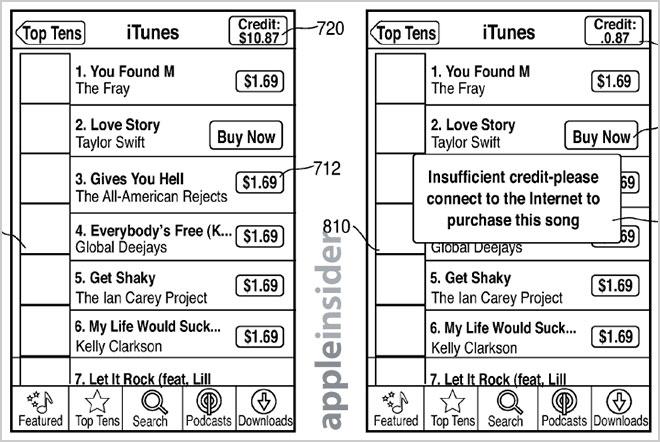Apple on Tuesday was awarded a patent for an offline purchasing system that would allow iTunes users to buy music, movies and other media when not connected to the internet.
The U.S. Patent and Trademark Office granted Apple U.S. Patent No. 8,417,575 for "On-device offline purchases using credits," which describes a system involving the purchase of offline credits stored on a given device that can be put toward media in the iTunes store even when not connected to the online marketplace.
Currently, iTunes users must be logged in or have an internet connection to successfully purchase and download content from the online storefront, but Tuesday's patent lays the groundwork for a type of "pre-loaded" payment system. Beyond the obvious applications for on-the-go iPod touch users and perhaps frequent travelers, the patent could be a harbinger of new never before seen iTunes functionality.
According to Apple, the proposed service involves media stored on an electronic device, like an iPhone or iPod touch, that is not part of the user's owned library. If a user wants to buy a track, but cannot connect to the Internet to provide a means of payment, they can use pre-paid credits previously purchased through the store and subsequently loaded onto the device. Once a data network is accessed, the appropriate deductions are made to a user's on-board credit allotment.
Users can add credits to their device accounts either through the device itself or what appears to be a specialized portal on the desktop version of iTunes, along with other options. Multiple forms of payment are accepted, including credit cards, bank accounts and other digitally connected assets a user links to their online profile.
iTunes interface.As noted by the patent, in order to play back a purchased song or movie, a device must first have a copy of said media item, as well as authorization to play back the content. The device can retrieve copies of "unauthorized" media in any number of ways, including recommendations downloaded from the media store. Carrying on with the recommendation example, the device can restrict access to the content in any number of ways until authorization, or a purchase, has been detected. In some instances, the media might be played back at a lower quality, or there could be a limit to how many times a track is played.
The locally-stored media can be displayed in a variety of arrangements, including a layout similar to the existing iTunes iOS app, making browsing and buying new content easy. Once a user makes a selection, they can purchase the locally stored media with the credits they bought in advance, which will remove the restrictions previously imposed on the content. In other words, the authorization and playback transaction would be fully completed offline.
Flowchart of payment system.The property could be a boon for iTunes users who don't have ready access to the Internet and, if made real, would likely drive sales for the digital music giant. Specific implementations were not thoroughly discussed, though Apple already has iTunes Match, which allows users iCloud access to their entire music collection, even tracks imported from CDs, for a yearly fee. While mere speculation, further cloud computing integration could bring even more tie-ins with the offline purchasing service, such as music sharing or gifting.
It remains unknown if and when Apple plans to roll out the offline crediting functionality, but the device-specific solution could theoretically be implemented with a firmware update as no hardware limitations were described in the patent.
Apple's offline purchasing patent was first filed for in 2010 and credits Taido Nakajima, Tyler Mincey, Gloria Lin and Joey Darragh as its inventors.
 Mikey Campbell
Mikey Campbell







-m.jpg)






 Andrew Orr
Andrew Orr
 Wesley Hilliard
Wesley Hilliard

 Oliver Haslam
Oliver Haslam
 Christine McKee
Christine McKee
 Amber Neely
Amber Neely










25 Comments
Sounds very much like an iRadio feature to me...
Sounds very much like "rent this iTunes track for a month". I no likes it.
Sounds very much like "rent this iTunes track for a month". I no likes it.
Just for comparison:
In 1965, singles were .49 and albums were $3.99-$4.99 - but often on sale.
A teacher made 2.65$ per hour on average. Volkswagen's Beetle was 1770$.
Sirloin steaks were 89 cents per pound.
You could resell your records as you wanted.
Nowadays, an iTunes album is on average 14.99$, but you can't resell it, which heavily reduces its "ownership(sic)" value. Movies are even more badly broken.
I'm afraid to see "offline credit" coming.
How is this idea radically different than the chipknip system? This is payment with bank card that also works when the bank is offline. You place a certain amount onto your cards chip and it can be used offline. When the system comes online it updates the banks records. An old idea.
[quote name="6ryph3n" url="/t/156875/apple-patents-offline-itunes-purchases-using-per-device-credit-system#post_2307140"]Sounds very much like an iRadio feature to me...[/quote] It reminds me a tad of Lala's old 10 cents for web streaming only. Perhaps there will be a feature where you can download x number of tracks for offline play, each working for say 30 days. Perhaps even free but restricted to the single device. If you want to keep them for longer you buy them, using this system even if you are offline. Next time you are online it validates ownership and you can use the tracks on all devices etc